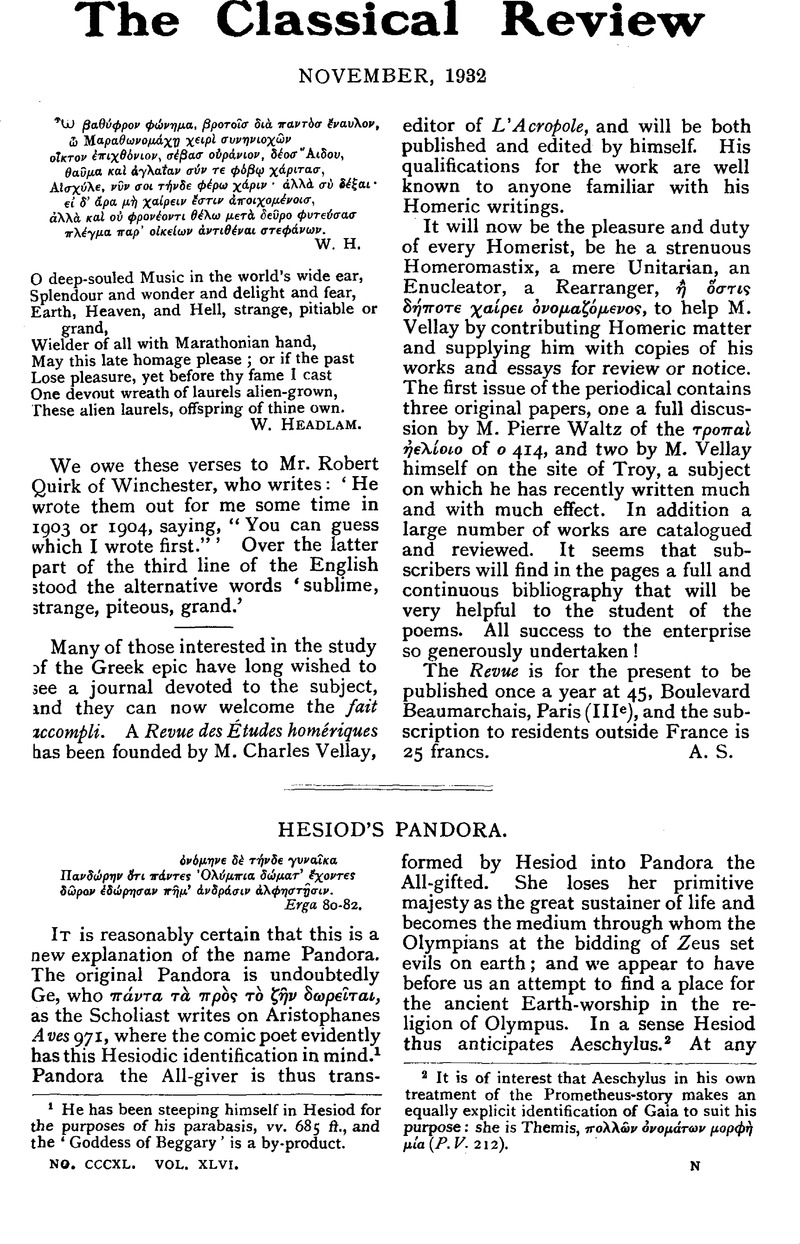Article contents
Hesiod's Pandora
Published online by Cambridge University Press: 27 October 2009
Abstract

- Type
- Review Article
- Information
- Copyright
- Copyright © The Classical Association 1932
References
page 193 note 1 He has been steeping himself in Hesiod for the purposes of his parabasis, vv. 685 ft., and the ‘Goddess of Beggary’ is a by-product.
page 193 note 2 It is of interest that Aeschylus in his own treatment of the Prometheus-story makes an equally explicit identification of Gaia to suit his purpose: she is Themis, πολλν νομν μορφ μα (P. V. 212).
page 194 note 1 Thus Girard, P. describes it, Rev. d. Et. gr. xxii, pp. 217 ff.Google Scholar
page 194 note 2 Gow, A. S. F., in Essays and Studies presented to William Ridgeway, pp. 99 ff.Google Scholar, finding a combination of a ‘Misogynist's Myth’ and a πθος-myth, neither story being intact in itself.
page 194 note 3 I see no reason to deny that this tale of Prometheus is what we are pleased to call allegory. In the first place, Prometheus, whatever the etymology of the word, is that which differentiates man from the rest of the animal kingdom; he represents Man. This is implied in Hesiod's version: why, otherwise, should the punishment for Prometheus' trick be visited upon man as a matter of course? This loss of easy βος precedes the theft; it is not quid pro quo. Secondly, Prometheus commonly represents civilisation. So Aeschylus interprets the σλας παντχνου πυρς (cf. P. V. 442 ff.); so also Protagoras understands it in that Dialogue. Here it is to counterbalance man's possession of fire (ντ πυρς, v. 57) that Zeus designs the πμα of evils after Prometheus' second offence, and this may conceivably mean that Hesiod sees a connection between civilisation and the evils of life. If there is no reference to fire as civilisation, that is because the poet wishes to show not the civilising of man but the origin of evils; this whole part of the poem is characterised by the rigid exclusion of all matter not directly pertinent to the simple design. That is why, for instance, the story of the tricking of Zeus, told at some length in the Theogony, is excluded from this work.
page 195 note 1 Epimetheus is necessary, since all men do not manifest the quality of Prometheus. Prometheus could, and did, foresee the evil; yet evils exist; hence Epimetheus.
page 195 note 2 J.H.S. xx, pp. 99 ff.
page 195 note 3 Thucydides Mythistoricus, pp. 493 ff.
page 195 note 4 Fab. lviii, where the jar contains τ χρηστ πντα, and for which he may well have had ancient authority: see Gow, op. cit., pp. 105–6.
page 195 note 5 Cf. vv. 90–1. (The mention of πνος here is merely a recapitulation.)
page 195 note 6 Elpis has of course its good side; so, Theognis 1135. But the same poet can speak of it as a χαλεπς δαμων (vv. 637–8). And Mr. Cornford has clearly shown that in Greek thought it is much more a dangerous passion than a virtue: Thuc. Myth., pp. 167 ff. See also his note, C.R. xxi, pp. 228 ff., with a reference to Zielinski's theory that Elpis really belongs to the religion of Gaia.
page 196 note 1 Perceived by O. Gruppe (quoted by Girard, op. cit., and rejected by Gow).
- 1
- Cited by


